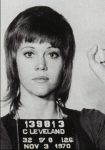 Jane Fonda (1937- ) is an American actress and political activist. Fonda’s outspoken political views, particularly her opposition to the Vietnam War, invited considerable controversy. Jane Fonda was born in New York City, the oldest child of Hollywood actor Henry Fonda. She was educated in Connecticut and as a teenager worked as a dance teacher and fashion model. In 1962 Fonda was named “Miss Army Recruiting” by the US Defence Department. She became a full time actor in the early 1960s, winning roles on Broadway and later in Hollywood films. Among Fonda’s more successful films are Cat Ballou (1965), Barbarella (1968), The China Syndrome (1979) and On Golden Pond (1981). Fonda has received seven Academy Award nominations. She twice won the best actress Oscar, for Klute (1971) and Coming Home (1978). In the latter of these films Fonda played a woman who has an affair with a wounded Vietnam War veteran, while her own husband is serving in Vietnam.
Jane Fonda (1937- ) is an American actress and political activist. Fonda’s outspoken political views, particularly her opposition to the Vietnam War, invited considerable controversy. Jane Fonda was born in New York City, the oldest child of Hollywood actor Henry Fonda. She was educated in Connecticut and as a teenager worked as a dance teacher and fashion model. In 1962 Fonda was named “Miss Army Recruiting” by the US Defence Department. She became a full time actor in the early 1960s, winning roles on Broadway and later in Hollywood films. Among Fonda’s more successful films are Cat Ballou (1965), Barbarella (1968), The China Syndrome (1979) and On Golden Pond (1981). Fonda has received seven Academy Award nominations. She twice won the best actress Oscar, for Klute (1971) and Coming Home (1978). In the latter of these films Fonda played a woman who has an affair with a wounded Vietnam War veteran, while her own husband is serving in Vietnam.
During the 1960s Fonda became a political activist involved in several causes. She supported the African-American civil rights movement, the Black Panthers (a black militant group), land rights for Native American and other liberation and rights-based movements around the world. Fonda was also heavily involved in the anti-Vietnam War movement. In 1970 Fonda, along with other artists, attended a number of “Free The Army” rallies, where serving soldiers and their families were questioned about America’s military involvement in Vietnam. Fonda also spoke at several anti-Vietnam War rallies, both in the US and abroad. By the early 1970s, Fonda had become a defiant figure of the anti-war and counterculture movements. This activism brought Fonda to the attention of the Federal Bureau of Investigation (FBI), which kept a comprehensive file on her statements and activities.
In July 1972 Fonda caused an uproar by undertaking a two-week tour of Hanoi, the capital of North Vietnam. This visit was backed by the North Vietnamese government but was undertaken without the approval of Washington. During her tour, Fonda visited American prisoners, spoke on local radio and criticised US military intervention in Vietnam, particularly its bombing campaign against the North. Fonda was controversially photographed wearing a North Vietnamese Army (NVA) helmet and sitting astride an anti-aircraft gun. This sparked outrage in the US and the ranks of the American military, some condemning Fonda (dubbed ‘Hanoi Jane’) as an enemy collaborator and propagandist. Fonda later apologised for her visit to North Vietnam, describing it as an attempt to humanise the North Vietnamese.
© Alpha History 2018-23. Content on this page may not be republished or distributed without permission. For more information please refer to our Terms of Use.
This page was written by Jennifer Llewellyn and Steve Thompson. To reference this page, use the following citation:
J. Llewellyn & S. Thompson, “Jane Fonda”, Alpha History, accessed [today’s date], https://alphahistory.com/coldwar/jane-fonda/.
